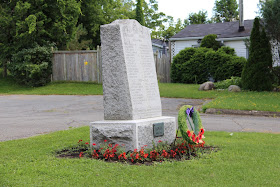 |
| "ARRIVAL" UNITED EMPIRE LOYALIST 1782 RALPH SKETCH Sc. 1988 |
Supplemental Posts
▼
Monday, February 26, 2018
Arrival
The sculpture titled 'Arrival' stands on a pedestal on the north side of the front walkway from Church Street to the entrance of St. Andrew's Church in Williamstown, Ontario. The sculpture commemorates the arrival of United Empire Loyalists to the region in 1782.
Thursday, February 22, 2018
Martintown Grist Mill
The Martintown Grist Mill occupies a place on the east side of the Raisin River, south of the tee junction of Dundas Street and County Road 20, in Martintown, Ontario.
THE MARTINTOWN GRIST MILL
This mill was built in 1846 to replace part of a milling complex developed by Malcolm McMartin early in the century. Like similar operations throughout the province, the McMartin mills provided essential local services in an era of poor transportaion. They served residents by sawing timber, carding wool, pulling cloth and grinding grain. The mills and their associated tavern and store attracted tradesmen and residents, creating the village of Martintown. Malcolm McMartin's son Alexander, builder of this mill, became and influential local businessman, militia leader and politician. His grist mill survived in a market increasingly dominated by larger competitors until it finally ceased operations in 1951.
Ontario Heritage Foundation Ministry of Culture, Tourism and Recreation
LE MOULIN DE MARTINTOWN
Ce moulin construit en 1846 remplace un moulin antérieur établi avec d'autres bâtiments par Malcolm McMartin au début du siècle. Comme ailleurs dans toute la province à une époque où les transports sont encore rares, les opérations McMartin offrent des services essentiels aux habitants des environs coupant le bois cardant et feutrant la laine et moulant le grain. Le moulin, la scierie, la taverne et le magasin attirent des ouvriers et artisans créant ainsi le village de Martintown. Alexander, fils de Malcolm McMartin, qui a fait construire ce moulin, devient un homme d'affaires, chef de milice et politicien influent dans la communauté. Son moulin réussit à survivre jusqu'en 1951 dans un marché dominé de plus en plus par de grosses entreprises.
Fondation du patrimoine ontarien, Ministère de la Culture, du Tourisme et des Loisirs
THE MARTINTOWN GRIST MILL
This mill was built in 1846 to replace part of a milling complex developed by Malcolm McMartin early in the century. Like similar operations throughout the province, the McMartin mills provided essential local services in an era of poor transportaion. They served residents by sawing timber, carding wool, pulling cloth and grinding grain. The mills and their associated tavern and store attracted tradesmen and residents, creating the village of Martintown. Malcolm McMartin's son Alexander, builder of this mill, became and influential local businessman, militia leader and politician. His grist mill survived in a market increasingly dominated by larger competitors until it finally ceased operations in 1951.
Ontario Heritage Foundation Ministry of Culture, Tourism and Recreation
LE MOULIN DE MARTINTOWN
Ce moulin construit en 1846 remplace un moulin antérieur établi avec d'autres bâtiments par Malcolm McMartin au début du siècle. Comme ailleurs dans toute la province à une époque où les transports sont encore rares, les opérations McMartin offrent des services essentiels aux habitants des environs coupant le bois cardant et feutrant la laine et moulant le grain. Le moulin, la scierie, la taverne et le magasin attirent des ouvriers et artisans créant ainsi le village de Martintown. Alexander, fils de Malcolm McMartin, qui a fait construire ce moulin, devient un homme d'affaires, chef de milice et politicien influent dans la communauté. Son moulin réussit à survivre jusqu'en 1951 dans un marché dominé de plus en plus par de grosses entreprises.
Fondation du patrimoine ontarien, Ministère de la Culture, du Tourisme et des Loisirs
 |
| A. McM. Sept. the 23rd 1846 |
Monday, February 19, 2018
Lancaster Cenotaph
The Lancaster Cenotaph occupies a place on the northwest corner of Duncan Street and High Street in Lancaster, Ontario.
Thursday, February 15, 2018
100 Years Powered Flight in Canada Tree
A tree commemorating 100 years of powered flight in Canada stands to the west of the Lancaster Cenotaph on the north side of Duncan Street, east of County Road 34, in Lancaster, Ontario.
This tree was planted in 2009 by the members of 253 Claude Nunney V.C. Squadron to commemorate 100 years of powered flight in Canada.
In cooperation with
Royal Canadian Legion
Branch 544
Canadian Forces School
Air Control Operations
S.D. & G
(Stormont, Dundas & Glengarry)
Highlanders
Cornwall Flying Club
Cornwall Canadian
Tire Corp.
 |
| CANADA 100 1909 - 2009 |
This tree was planted in 2009 by the members of 253 Claude Nunney V.C. Squadron to commemorate 100 years of powered flight in Canada.
In cooperation with
Royal Canadian Legion
Branch 544
Canadian Forces School
Air Control Operations
S.D. & G
(Stormont, Dundas & Glengarry)
Highlanders
Cornwall Flying Club
Cornwall Canadian
Tire Corp.
Monday, February 12, 2018
Apple Hill Cenotaph
The Apple Hill Cenotaph occupies a place on the east of Old Orcard Street (County Road 20) north of St. Joseph Street, in Apple Hill, Ontario.
 |
| ROYAL CANADIAN LEGION GLENGARRY BRANCH 312 |
 |
| KOREA 1950 — 1953 |






















































